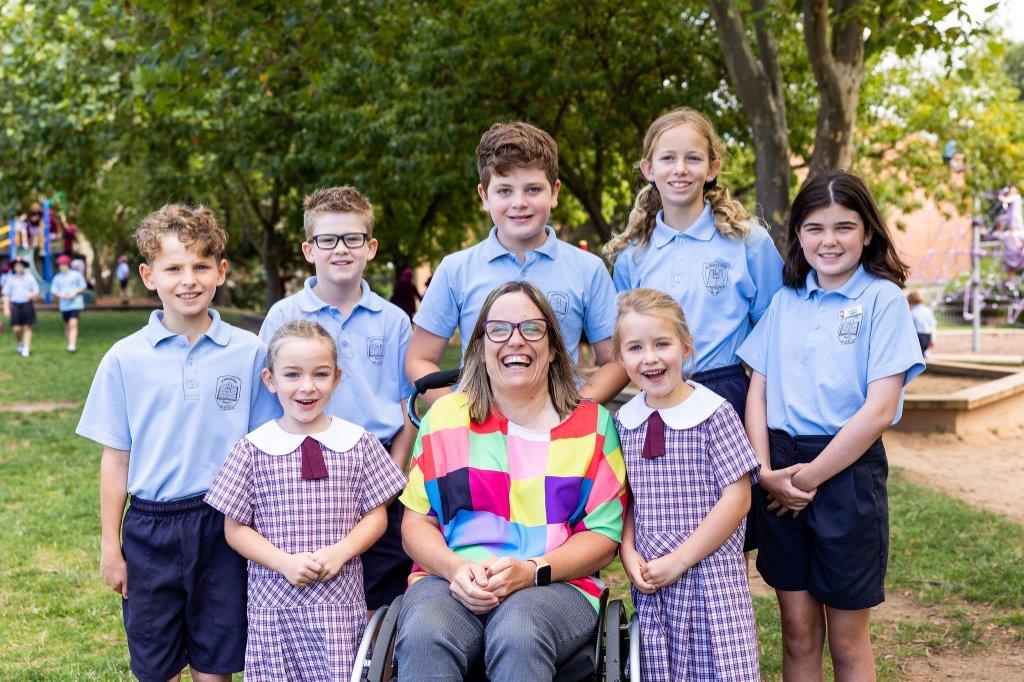Latest News

In 2022, Laura Frogley, Classroom Support Teacher at St Monica’s Primary School in Evatt, completed the demanding Highly Accomplished Teacher certification.
Highly Accomplished and Lead Teacher (HALT) certification is a national initiative of the Australian Institute for Teaching and School Leadership. It’s a voluntary process where individual teachers demonstrate that they meet the Australian Teacher Standards at the highest levels.
The ACT has the highest proportion of HALTs in Australia and Catholic Education Canberra Goulburn (CECG) places a high priority on supporting the certification of Highly Accomplished and Lead teachers across our schools in the ACT and NSW.
A spokesperson for the ACT Teacher Quality Institute (TQI) says that CECG is ‘punching above its weight in terms of contribution to [HALT] certification in the ACT’. Teachers in CECG schools make up 15 per cent of the ACT’s fully registered teachers but 30 per cent of its HALT certified teachers.
‘It’s the best professional development I’ve ever done’
Laura describes HALT certification as ‘almost like doing another degree’. She previously completed a master’s degree in inclusive learning and studied Australian Sign Language. HALT has contributed to her move, after 12 years as a classroom teacher, into a classroom support role—the fulfilment of a lifelong passion.
‘I have cerebral palsy, so I’m in a wheelchair myself. I think growing up with that has given me an insight into working with people and understanding children and families with additional needs.’
She describes HALT as ‘the best professional development that I’ve ever done’.
‘You’re able to pull apart your practice and your approach beyond the classroom as well. You’re able to find a few gaps and say, “This is what I need to focus on improving in knowledge and practice.”’
Highly Accomplished (HA) status in itself wasn’t Laura’s motivation. ‘It was more that I wanted to make sure I was doing the best I could for the students in my class and the school community as well.’
‘If you’re in front of a classroom and you’re telling your students to put 100 per cent effort in, I feel that it needs to be something you model yourself.’
‘Catholic schools are always focused on the whole child’
What Laura values most about Catholic education is ‘a real focus on the whole child, the whole family, the whole community’.
‘Don’t get me wrong—education is always in the forefront of our minds and our hearts. But if our students aren’t comfortable and confident and feeling safe, they’re not going to learn and be successful with their learning.’
The evidence-based Catalyst professional development for teachers in CECG schools complements this philosophy.
‘This is how their brain works. So therefore they’re more comfortable in the classroom environment, approaching what they need to approach, and they’re gaining confidence.’
Laura’s role is across the whole school (Kindergarten to Year 6) and involves constant liaison between families and the school.
‘It’s not just about that child but also about their family. Obviously our first concern is the child, but if we see that a family member might have been struggling a bit, we want to support everybody in the process because we’re all working together as support for that child.’
‘It’s really important to have explicit instruction’
Laura’s education degree and early career were grounded in inquiry-based approaches to teaching. ‘Sometimes I used to think, “Are the students actually really learning anything?”’ she recalls. The introduction of Catalyst has removed this element of uncertainty in key areas.
‘Giving them a question and letting them explore or letting them wonder—that has its place in some areas. But if you’re talking about Literacy and Maths, the crux of life skills, I think it’s really important to have Explicit Instruction happening. You feel that you’re doing it justice.’
There are immediate effects in the classroom.
‘Because you see the results, you can see that it’s actually working. You get feedback instantly. You’re getting it instantly whether the students are understanding it or not. And then you can adjust it from there.’
‘It hasn’t just been “Good luck; have fun”’
High-impact teaching doesn’t happen without high-level professional learning.
As the TQI’s spokesperson observes, Catalyst and HALT have this in common: ‘High-impact teaching practices are at the very core of certification, as the kinds of strategies that HA and Lead teachers must be able to evidence.’
Giving and getting feedback is also an essential part of the teacher’s development in both HALT and Catalyst.
‘[HALT] gives you a really good opportunity to have open conversations among colleagues about what they’re doing and what results they’re seeing’, says Laura.
‘And that’s where Catalyst is also headed, in terms of looking at each other’s practice and exploring what’s happening for them and what’s working and what may not be working.’
‘It hasn’t just been “Good luck; have fun”; there’s been a lot of coaching and modelling of best practice as well. And once it’s been modelled to us, we’ve been observed by the coaches again and they’re able to give us feedback and work on our approach and our delivery.’
For Laura and her colleagues, the outcomes for their students amply justify the effort.
